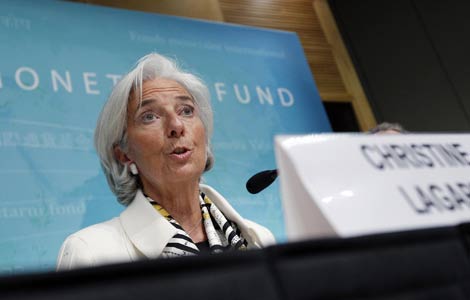IMF: US economy to grow 2.7 percent in 2014
Updated: 2013-06-15 09:12
(Agencies)
|
|||||||||
 |
|
International Monetary Fund Managing Director Christine Lagarde speaks during a news conference at IMF headquarters in Washington June 14, 2013.[Photo/Agencies]
|
The scaling down in the forecasted economic growth rate was largely due to the ongoing automatic budget cuts across the federal governmental departments, also known as sequester, which will be affecting economic recovery next year, IMF Managing Director Christine Lagarde said at a press conference Friday.
The U.S. economic growth is expected to slow to 1.9 percent this year owing to an excessively rapid pace of fiscal deficit reduction, the same as its April prediction, the IMF said in a concluding statement after an annual review of U.S. economic and financial situations.
"The U.S. recovery has remained tepid over the past year, but underlying fundamentals have been gradually improving." The modest growth rate of 2.2 percent last year reflected legacy effects from the financial crisis, fiscal deficit reduction, a weak external environment and temporary effects of extreme weather-related events, noted the statement.
Despite these headwinds, the nature of the recovery appears to be changing. In particular, home prices and house construction activity have rebounded, along with strengthening of household balance sheets and improvement of labor market conditions, and corporate profitability and balance sheets remain strong, especially for large firms, said the Washington-based global lender.
The U.S. economic recovery is "gaining ground and becoming more durable," and the housing market and labor market are doing better, supported by the U.S. Federal Reserve's easy monetary policy. But the economy still has "way to go" before returning to full strength, Lagarde told reporters.
The ongoing sequester is a major risk for U.S. economic growth. Another fiscal worry is doing too little further down the road on fiscal consolidation after having done too much in the short term, she stressed.
The IMF suggested the United States should repeal the sequester and adopt a more balanced and gradual pace of fiscal consolidation in the short term.
The sequester was included in the August 2011 debt-ceiling package to force lawmakers to come up with a long-term deficit reduction plan. After the failure to produce such a plan in November 2011, a total of more than 1 trillion U.S. dollars cuts over a decade were triggered starting this year, or about 109 billion dollars per year.
The Fed's quantitative easing (QE) monetary measures have been "extremely useful" in bolstering economic growth and should continue. The IMF predicted the Fed to maintain its current asset purchase program until the end of this year and that the Fed should carefully manage its QE exit plan to avoid disrupting the markets, Lagarde noted.
As the legacy of the financial crisis wanes further, private domestic demand in the world's largest economy is expected to continue recovering, but weak growth in a number of trading partners is projected to weigh on U.S. export growth, according to the statement.

 Michelle lays roses at site along Berlin Wall
Michelle lays roses at site along Berlin Wall
 Historic space lecture in Tiangong-1 commences
Historic space lecture in Tiangong-1 commences
 'Sopranos' Star James Gandolfini dead at 51
'Sopranos' Star James Gandolfini dead at 51
 UN: Number of refugees hits 18-year high
UN: Number of refugees hits 18-year high
 Slide: Jet exercises from aircraft carrier
Slide: Jet exercises from aircraft carrier
 Talks establish fishery hotline
Talks establish fishery hotline
 Foreign buyers eye Chinese drones
Foreign buyers eye Chinese drones
 UN chief hails China's peacekeepers
UN chief hails China's peacekeepers
Most Viewed
Editor's Picks

|

|

|

|

|

|
Today's Top News
Shenzhou X astronaut gives lecture today
US told to reassess duties on Chinese paper
Chinese seek greater share of satellite market
Russia rejects Obama's nuke cut proposal
US immigration bill sees Senate breakthrough
Brazilian cities revoke fare hikes
Moody's warns on China's local govt debt
Air quality in major cities drops in May
US Weekly

|

|








